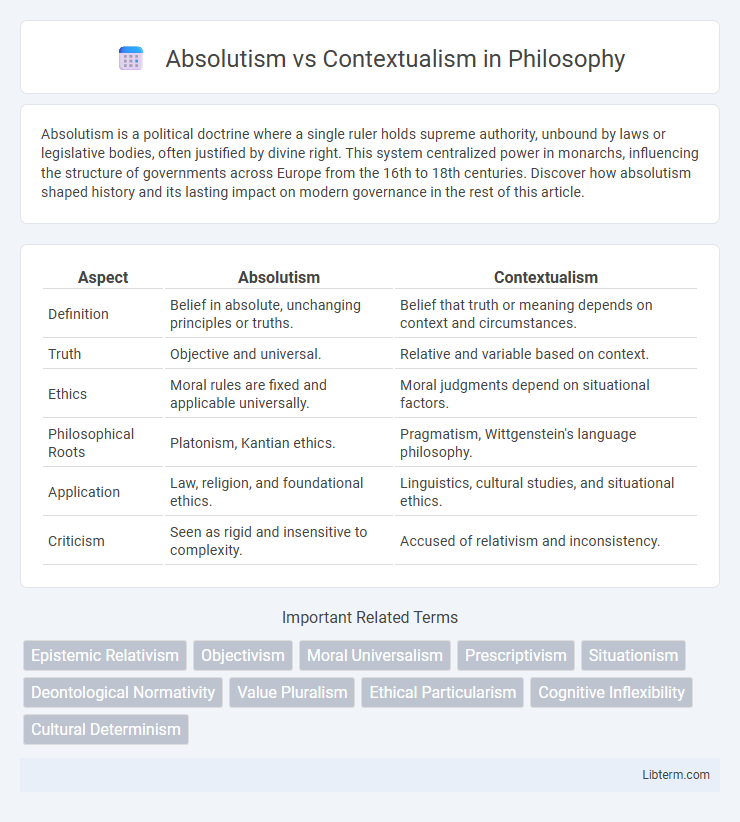Absolutism is a political doctrine where a single ruler holds supreme authority, unbound by laws or legislative bodies, often justified by divine right. This system centralized power in monarchs, influencing the structure of governments across Europe from the 16th to 18th centuries. Discover how absolutism shaped history and its lasting impact on modern governance in the rest of this article.
Table of Comparison
| Aspect | Absolutism | Contextualism |
|---|---|---|
| Definition | Belief in absolute, unchanging principles or truths. | Belief that truth or meaning depends on context and circumstances. |
| Truth | Objective and universal. | Relative and variable based on context. |
| Ethics | Moral rules are fixed and applicable universally. | Moral judgments depend on situational factors. |
| Philosophical Roots | Platonism, Kantian ethics. | Pragmatism, Wittgenstein's language philosophy. |
| Application | Law, religion, and foundational ethics. | Linguistics, cultural studies, and situational ethics. |
| Criticism | Seen as rigid and insensitive to complexity. | Accused of relativism and inconsistency. |
Introduction to Absolutism and Contextualism
Absolutism asserts that certain moral principles are universally valid, regardless of circumstances or cultural differences, emphasizing unchanging ethical standards. Contextualism argues that moral judgments depend on the specific context, considering factors such as intentions, cultural norms, and situational details to determine right or wrong. These contrasting approaches shape foundational debates in ethics, law, and philosophy by addressing whether morality is fixed or adaptable.
Defining Absolutism: Core Principles
Absolutism centers on the belief in universal moral principles that apply consistently across all situations and cultures, emphasizing objective truths in ethics and law. This framework upholds fixed standards without exceptions, ensuring clear-cut guidance for moral judgments and decision-making. Core principles include the immutability of ethical norms and the rejection of relativism or situational variations in determining right and wrong.
Understanding Contextualism: Key Concepts
Contextualism emphasizes understanding meaning and truth as dependent on situational factors and linguistic contexts rather than fixed absolutes. Key concepts include indexicality, where expressions derive significance from their use within specific scenarios, and the dynamic interplay between speaker intentions and environmental cues. This framework challenges absolutism by proposing that semantic interpretation varies across different contexts, enhancing precision in communication and meaning analysis.
Historical Development of Absolutism
Absolutism emerged prominently in 17th-century Europe, characterized by centralized monarchial power exemplified by Louis XIV of France, who declared "L'etat, c'est moi" to emphasize absolute rule. This political doctrine rejected the fragmented feudal authority, aligning sovereignty exclusively with the monarch to enforce uniform legal and administrative control. The historical development of absolutism was significantly influenced by the decline of feudalism, religious conflicts like the Thirty Years' War, and the rise of sovereign nation-states demanding strong, centralized governance.
Evolution of Contextualist Thought
The evolution of contextualist thought marks a significant shift from rigid absolutism to a more nuanced interpretation of meaning, emphasizing context in linguistic and philosophical analysis. This development underscores how meaning can vary depending on situational factors, speaker intentions, and background knowledge, challenging the fixed truth-values favored by absolutism. Advances in semantics and pragmatics have further propelled contextualism, highlighting its adaptability and relevance in real-world communication and cognitive processes.
Absolutism vs Contextualism: Main Differences
Absolutism asserts that moral principles are universal and unchanging regardless of context, emphasizing objective standards. Contextualism argues that moral judgments depend on situational factors, highlighting the importance of context in ethical decision-making. The main difference lies in Absolutism's fixed rules versus Contextualism's flexibility according to circumstances.
Practical Applications in Ethics and Law
Absolutism in ethics and law asserts fixed moral principles applicable in all situations, guiding clear and consistent decision-making. Contextualism emphasizes the importance of situational factors, allowing for flexibility and adaptation based on specific circumstances. Practical applications show absolutism fosters uniform legal standards, while contextualism supports case-by-case judgments that consider cultural, social, and individual nuances.
Strengths and Weaknesses of Absolutism
Absolutism offers clear, consistent ethical standards that provide definitive guidance in decision-making, ensuring impartiality and stability across diverse situations. Its main weakness lies in its rigidity, as it fails to account for the complexities and nuances of specific contexts, potentially leading to unjust or impractical outcomes. This inflexibility limits moral adaptability, often ignoring cultural differences and situational variables that contextualism prioritizes.
Advantages and Challenges of Contextualism
Contextualism in epistemology offers the advantage of flexibility by allowing knowledge attributions to vary based on context, which can better reflect everyday language use and accommodate differing standards of evidence. It addresses challenges faced by Absolutism by acknowledging that what counts as "knowing" can shift depending on situational factors, thereby reducing skepticism and promoting practical understanding. However, Contextualism faces the challenge of potential relativism and difficulties in establishing clear criteria for context shifts, which can complicate objective knowledge assessments.
Conclusion: Navigating Between Absolutism and Contextualism
Navigating between absolutism and contextualism requires balancing universal principles with situational nuances to achieve practical and ethical decision-making. Absolutism offers clear, consistent guidelines, while contextualism adapts to complexity and diversity, preventing rigid or unjust outcomes. Effective navigation integrates both approaches, promoting flexibility without sacrificing foundational values.
Absolutism Infographic

 libterm.com
libterm.com